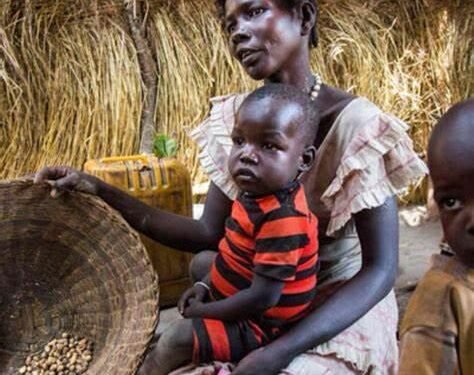A joint report by South Sudan government and U.N. agencies on food security for 2025 has revealed that 7.7 million of the population face acute food shortages.
A report by the World Food Program, UNICEF and the Food and Agriculture Organization (FAO) claimed that the looming hunger is cause by conflict in most part of the country that did not allot people to cultivate.
Addressing the participates during the release of the Integrated Food Security Phase Classification (IPC), FAO South Sudan representative Meshak Malo Said that the recent conflict in the country has put many people in serious hunger.
“The population of 83,000 was not there last year but has emerged due to conflict, particularly in Upper Nile and Pibor,” Malo said.
He urged South Sudan government to bring peace and stability to the country as well collaborating with the partners to reduce food insecurity.
Mary-Ellen McGroarty, WFP’s South Sudan director, said 200,000 young children in four Upper Nile counties are at high risk of malnutrition. However, she noted some improvement in areas where stability allowed farming and market recovery.
Anita Kiki Gbeho, the U.N. humanitarian coordinator for South Sudan, called for urgent intervention. “We must act now,” she said, stressing the need for peace to ensure aid effectiveness.
Hussein Abdelbagi Akol, South Sudan’s agriculture minister, pledged government support for farmers to boost production.
“We must stabilize our economy to protect citizens from suffering,” he said.
Edmund Yakani, a civil society activist and the Executive Director for Community Empowerment for Progress Organization (CEPO) urged better security and investment in agriculture using non-oil revenue.
“Military confrontation only worsens food insecurity,” he said.
The IPC reports
The Integrated Food Security Phase Classification (IPC), the leading global measure for hunger crises, declares famine when: 20% of households face extreme food shortages; at least 30% of children suffer acute malnutrition; and two adults or four children per 10,000 people die daily from hunger-related causes.
The latest IPC report, released in Juba today, estimates that 2.4 million people will face emergency food shortages and 5.2 million will be in crisis between April and July 2025. Conflict, low agricultural production, economic instability and climate shocks are key drivers of food insecurity.
Last year’s IPC report projected 7.7 million South Sudanese would face severe hunger between April and July 2024.












